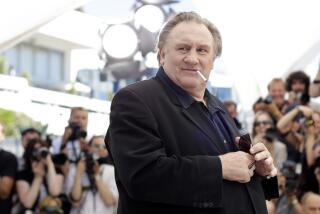Classic Hollywood: Geneviève Bujold learned about movies (and food) from the masters
It’s good that award-winning French filmmaker Alain Resnais listened to his mother. If not, Geneviève Bujold’s film career may have taken a different turn.
Flashback to 1965: The young French Canadian actress was appearing in Paris with the Montreal-based Théâtre du Rideau Vert , when Resnais’ (“Hiroshima, Mon Amor,” “Last Year in Marienbad”) mother saw one of her performances.
She immediately called her son who was casting his award-winning 1966 political drama “La Guerre Est Finie” with Yves Montand and looking for a young actress to play a member of an extremist political group.
So being a dutiful son he went to see Bujold on stage. “Suddenly, I got a call,” noted Bujold, 75, during a recent phone interview from her Malibu home. “I met him. He had a little camera, and we talked. And he told me something that to this day I try and practice — ‘always go to the end of your movement,’” meaning follow through on everything you do. “Even if I was young and not wise I thought, ‘Oh, I like that. I am gonna remember that.”’
No sooner had she returned to Montreal than she went back to Paris to star with Alan Bates in Philippe de Broca’s 1966 antiwar fable, “King of Hearts,” which returned to theaters March 9 in a beautiful 4K restoration.
“King of Hearts” was not a hit when it was initially released in France and the U.S. but became a midnight movie, a counter-culture hit in the U.S. in the 1970s with young audiences. In fact, it played at the Central Square Cinema in Boston for five years.
Set in a quaint French village during World War I, the magical comedy revolves around a Scottish soldier (Bates) sent into the town to diffuse the bombs that had been rigged to explode at midnight. The only people left in the village are the colorful escapees from the town’s mental asylum who aren’t quite as crazy as the soldiers on each side of the conflict.
The gamin Bujold plays the enchanting Coquelicot with whom Bates falls in love. The rest of the cast is a who’s who of famous French actors including Pierre Brasseur, Jean-Claude Brialy and Michel Serrault.
The actress has warm memories of the production, which was shot in the small medieval town of Senlis, France, north of Paris.
It was really magical, the shooting of the film, because it was real, fun and poetic.
— Geneviève Bujold on “King of Hearts”
“It was really magical, the shooting of the film,” Bujold reflected, “because it was real, fun and poetic.”
The late de Broca had “bottomless” energy and a “very, very healthy enthusiasm for everything, for life, for what he did. That power was on the set daily”.
As was the quintessentially excellent French food.
“As you know, meal time is a sacred time,” she explained. “When we were shooting in the morning we knew we would have a beautiful lunch. They would set tables outside with white table clothes, wildflowers and good food. Then we went back to work.”
Bujold said she was too young to be intimidated by her famous costars or Resnais, de Broca and later Louis Malle, with whom she did 1967’s “The Thief of Paris.”
“That was one element that I had working for me,” said Bujold. “I was young. I was like an unwritten page. They all helped me, more than helped me, they sculpted, almost, my career and life. I am who I am today because [of those films].”
But most audiences know Bujold for her haunting Oscar-nominated performance as the tragic Anne Boleyn opposite Richard Burton’s Henry VIII in 1969’s “Anne of the Thousand Days.”
It was veteran Hal B. Wallis, who produced countless films including the 1942 Oscar-winning “Casablanca,” who pursued Bujold for the film after seeing her in the 1968 Canadian film “Isabel,” that was directed by her late ex-husband Paul Almond.
“I was young, independent and opinionated,” she said. “I got a call saying that Hal Wallis, the great Hal Wallis, wanted to talk to me. He wanted to give me the role of Anne and asked me for a screen test. Me, in my kitchen in the east end of Montreal, said, ‘No, I don’t want a screen test. He told me afterwards, he kind of loved that because he thought that was the spirit of Anne.”
Burton, who also got one of the film’s 10 Oscar nominations, was a force of nature, said the actress. “We were perfect for both those roles. The film ended, and he went on with his life and I went on with mine.”
Wallis wanted Bujold to next star in 1971’s “Mary, Queen of Scots,” which would be directed by “Anne” filmmaker Charles Jarrott.
“It was great doing Anne, but to do another queen, I just didn’t feel up for it.”
Instead she worked for such directors as Brian De Palma, in the haunting 1976 thriller “Obsession,” Michael Crichton, in 1978’s suspense thriller “Coma,” David Cronenberg, in 1988’s horror film “Dead Ringers” and being the perfect muse for indie icon Alan Rudolph in 1984’s ‘Choose Me,” 1985’s “Trouble in Mind” and 1988’s “The Moderns.”
Bjuold continues to work mainly in independent film — including the acclaimed 2012 Canadian romantic drama “Still Mine” — but she finds that good roles are few and far between for actresses in her age group. “I don’t get many offers, and the few offers I get I don’t want to do.”
But she’s hoping that an indie film with a “beautiful script” to be shot in New Zealand will come together. “They’re looking for the money now, and I have a feeling it will happen.”
Bujold admits she feels most at home on a movie set. “The camera — the film camera — is like the eye of God. I feel I belong there.”
More to Read
Only good movies
Get the Indie Focus newsletter, Mark Olsen's weekly guide to the world of cinema.
You may occasionally receive promotional content from the Los Angeles Times.







